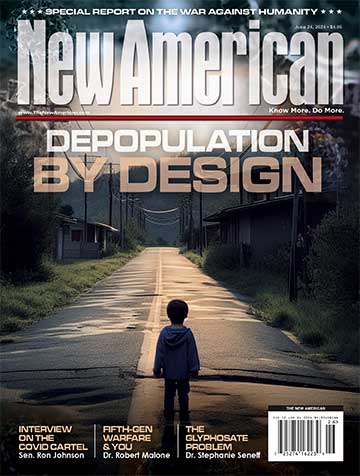
In a recent Convention of States® (COS) blog post, an attempt was apparently made to smear The John Birch Society. The attempt was abortive, at best, given the lack of merit of the claims and the lack of skill in the making of them. To put it simply, the arguments made by COS in the post were laden with logical fallacies.
A logical fallacy is an error in reasoning that undermines the logical integrity of an argument, rendering it invalid or misleading. These fallacies often arise from flawed logic or deceptive tactics, and their presence is both embarrassing and unnecessary. They reflect poorly on the author’s ability to construct coherent, persuasive arguments, signaling a lack of intellectual rigor and an incapacity to effectively critique an opponent. Logical fallacies betray a fundamental weakness in argumentation, revealing that the writer is unable to confront opposing viewpoints with sound reasoning and substantive evidence.
For the benefit of the reader (and the author of the COS post), this article identifies and analyzes a few of the the various logical fallacies present in the COS essay, illustrating how such errors diminish the credibility and effectiveness of the arguments presented, and should give pause to all well-intentioned, sincere seekers of truth who have found themselves falling for the propaganda published by COS.
The Logic Fallacies:
1. Appeal to Authority (Argumentum ad Verecundiam)
The text frequently cites authoritative figures (e.g., William F. Buckley Jr., Barry Goldwater, Russell Kirk) to support its claims without providing substantial evidence of why the opinion of these men should be accepted without challenge. For instance, the statement, “As the New York Times said of Russell Kirk’s formative work, ‘The Conservative Mind,'” relies on the authority of The New York Times rather than presenting an argument for the claim. It’s no exaggeration to describe the COS blog post as an example of how one relies on an appeal to authority when one knows he cannot appeal to evidence or facts.
2. Appeal to Popularity (Argumentum ad Populum)
The text suggests that because Buckley, Goldwater, and Kirk were popular and influential, their views must be correct. This is evident in phrases like “a movement for the masses” and describing their efforts as appealing to those “left behind by the day’s seemingly ascendant spirit of liberalism.” Popularity does not inherently validate the correctness of an idea. In fact, these days popularity more often than not invalidates the correctness of an idea.
3. “Straw Man” Fallacy
The COS post creates a simplified and exaggerated version of The John Birch Society’s beliefs to discredit them. Descriptions of Robert Welch’s claims such as “Dwight D. Eisenhower was a Communist agent,” and “fluoridated water was a Communist-backed plot,” decontextualize Welch’s views, failing to place them properly within the scope of the Society’s broader positions, thus making it easier to dismiss them as “extreme.”
4. Ad Hominem Fallacy
Attacking the character of individuals rather than addressing their arguments is a common fallacy in the COS blog post. For instance, calling Robert Welch “loony” and suggesting he should be “put away” focuses on discrediting Welch personally rather than engaging with his ideas. Similarly, labeling Welch’s influence as “near-hypnotic” serves to undermine his credibility without substantive critique of his arguments.
5. Guilt by Association
The text associates the entire John Birch Society with Welch’s views, thereby attempting to discredit the whole organization without a single refutation of Welch’s assertions. Statements like “his movement was so hopelessly enamored with their founder’s quack conspiracies” imply that all members and ideas within the society are invalid because of Welch’s positions, rather than evaluating individual arguments on their own merits, which, again, the author of the COS post does not — and likely cannot — do.
6. Hasty Generalization
The text of the post makes broad generalizations based on limited evidence. For example, “Since the right-wing advocacy group’s founding in 1958, the John Birch Society’s fondness for flinging unhinged, sensationalized accusations against its own side has been the source of more harm than good for conservatism.” This sweeping statement does not consider the diversity of opinions and actions within the JBS over time, and it does not consider the vast array of issues over more than six decades on which The John Birch Society has been proven prescient.
7. Slippery Slope Fallacy
There is an implicit slippery slope argument suggesting that allowing The John Birch Society’s influence to grow will inevitably lead to the discrediting of the entire conservative movement. This is implied in phrases like “‘the Birch fallacy’ persists today [and] continues to block real conservative progress.” The argument assumes a direct and unavoidable progression from the ever-increasing JBS influence to the complete failure of conservative efforts, all without providing a single syllable of evidence for this implied inevitability. That is likely due to the demonstrable fact that the insight, impact, and influence of The John Birch Society grows stronger as Americans begin to appreciate the Society’s unwavering advocacy of the Constitution and the freedom it protects at a time when so many seem to have abandoned that sacred document.
8. False Dilemma (False Dichotomy)
The text often presents issues as having only two possible outcomes: either support the mainstream conservative leaders, or fall into the “unhinged” “extremism” of The John Birch Society. For instance, the assertion that conservatives must “exorcise the fringe group from the movement” implies that the only choices are to either fully reject the JBS or accept it in its entirety, without considering the accuracy of the JBS positions, or the current trajectory of the beliefs and policies advanced by “mainstream conservative leaders.”
Conclusion
This article’s identification and explanation of the many logical fallacies present in COS’s addled attempt to besmirch The John Birch Society reveals very clearly that, not only are the COS arguments in support of an Article V constitutional convention fallacious and illogical, but their arguments opposing The John Birch Society are too.



